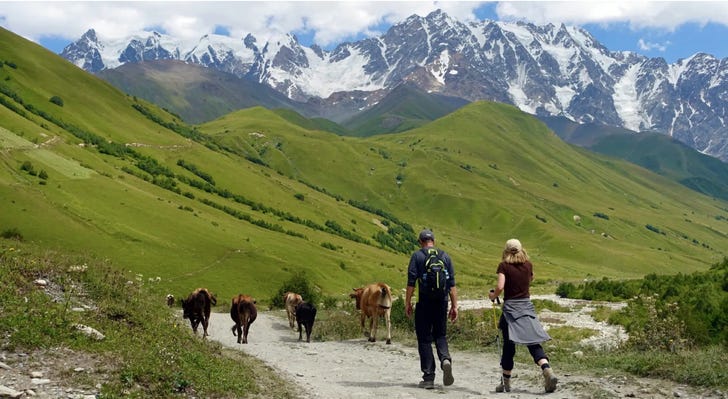The history of digital nomading
A "Titanic" train station that's now a hotel, walking around islands, and see you at the Brisbane Olympics?
Hello from Ho Chi Minh City. Today would have been the end of the last two weeks of lockdown, but everyone knew that wasn’t going to be realistic. Sure enough, the lockdown has now been extended for another two weeks.
During this lockdown time, I began researching the history of digital nomading. It took me down so many rabbit holes of memories that I spent half the time reading old blog posts. I was surprised how far back the concept of working remotely goes, including Arthur C. Clarke (writer of 2001: A Space Odyssey) predicting that people would be remote working in Bali.
Latest posts at Nomadic Notes
With an increased interest in digital nomadism, I’ve put together this digital nomad history to show how we got to where we are now.
COVID-19 and travel
•The travel industry is a total mess, but everyone is traveling anyway
• Same mood in Saigon…
Assorted travel reads
• Europe’s unluckiest train station gets new lease of life as hotel
“Once-grand Canfranc was known as the Titanic of the mountains, but fell into disrepair thanks to fire, derailment and war.”
• The world’s greatest places of 2021
Not to be outdone by Lonely Planet’s Best In Travel List and the NY Times 52 Places list, Time has come up with a Top 100 Great Place listicle (login required). Kind of pointless, but I still like seeing what they picked and why. Vietnam made the list 3 times.
Maybe it’s the pandemic lockdown talking, but I’m finding the idea of walking around Ko Pha Ngan very appealing at this point. I’ve actually thought about walking around islands before, including Bali. I’m not sure if anyone has done it, and after surveying the walking path on Google Maps satellite view I’m not sure anyone would want to. This walk at least seems more sensible.
• And more walking, here is a new hiking route between Europe and Asia
“Spanning three countries and extending 1,500km, the soon-to-open TCT will take hikers into the heart of some of the world's most culturally and ecologically diverse regions.”
• On England’s canals, boaters embrace the peace and pace of a floating life
“More people are calling England’s canals — and the narrow boats used to navigate them — home as remote work options in the pandemic’s wake make a mobile lifestyle more possible.”
• Brisbane wakes as Olympics 2032 city after IOC's landslide vote of confidence
The Tokyo 2020 Olympics starts today. Usually, I would be glued to the TV for 2 weeks. Now it feels like a non-event. I am happy though that Brisbane has become the third city in Australia to host an Olympics. I’m not famous for planning 11 years in advance, but I will probably go. The scary thing is that I will be 60 when it is on.
[Will I look like Bill Murray by 2032?]
• A very Japanese Olympics: Fencing taxis, rifle manga, and mountain-shaped rice balls
• The well-tempered traveler is a one-page weather visualization chart for cities around the world.
• Shinjuku Station is getting a ¥72.8 billion makeover to make it easier to navigate
“Renovations to make the world’s busiest train station easier to use are underway – but it’ll take 26 years.”
• China debuts world's fastest train
• Inside the disused Welsh railway tunnel that could become Europe's longest underground cycle route
• Landing on one of the world’s most challenging airport runways in Funchal, Madeira
• $73,499-per-guest world cruise sells out in less than 3 hours
• Every country’s antipode. (Opposite point.)
when I arrived in London in 1999 I discovered that Australians are called Antipodeans, so named for being the antipodes of the UK. It turns out though that Australia is plonked in the middle of the North Atlantic.
• Bharat Mata Temple: A shrine dedicated to Mother India
The Nomadic Notes Travel Newsletter is a weekly newsletter of the best travel reads and interesting travel news from around the web, and random ramblings by the editor.
- James Clark












